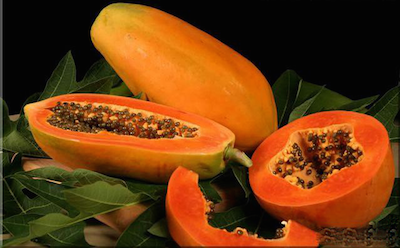



Papaya
Enjoy papaya
(Carica papaya)
Papaya contains papain, a strong anti-inflammatory. Its supplement is sold over the counter as an anti inflammatory. Both green papaya fruit and the tree's latex are rich in papain, a protease used for tenderizing meat and other proteins. Papain has the ability to break down tough meat fibers and has been used by indigenous Americans. It is now included as a component in powdered meat tenderizers. Phytochemicals in papaya may suppress the effects of progesterone. In Indonesia, the locals eat the seeds to thwart malaria. Papaya may protect the kidney from toxins.
Papaya is one of the highest sources of lycopene. Papaya is very alkaline, especially when eaten about twenty minutes before a meal. This releases its natural enzymes helping digest the meal that follows. High levels of papain, a strong anti-inflammatory found in papaya, is useful for relieving back ache, muscle aches especially useful for fellow PKD'rs who cannot take aspirin or NSAIDs, or tylenol. The lucky cows in Hawaii are fed papaya in place of grass. Hawaiian beef is said to be very sweet and tender.
Papain
Papain found within papaya is such a strong anti-inflammatory that is can sometimes be used to replace anti-inflammatories such as aspirin like drugs in the treatment of arthritis, fever and such.
β-Carotene 3 x Higher in Papaya
Carotenoids are more bioavailable from papaya than from tomato and carrot in humans: a randomized cross-over study revealed. This same study also found that lycopene was approximately 2.6 times more bioavailable from papayas than from tomatoes.
These Types are GMO Papaya
Sunrise
Strawberry
Rainbow
SunUp
Red flesh
Non-GMO papaya seeds available to the public in limited quantities starting October 1, 2010 from the University of Hawai'i (UH) seed program. Sunrise and Waimanalo X-77 (low bearing) varieties will be available. A true, non-GMO papaya has a rich, deeply yellow flesh, not golden or even pink or red like the hybrids.
Non GMO papaya is called the "Kapoho" or "Kapoho Solo" papaya, so look for this name if you can.
Check for GMO by the Attached Sticky PLU Labels
A good strategy is to take a look at those little sticker labels on your papaya. They will contain a PLU code, or number, that will indicate how the fruit was grown:
Four numbers, for example: "1034" = Conventionally grown
Five numbers starting with the number 9: "90123" = Organically grown
Five numbers starting with the number 8: "80123" = Genetically Modified
Genetically modified GMO rainbow papaya developed specifically to withstand Ringspot Virus invasion for shipping. Monsanto owns the rights to GMO rainbow papaya developed by injecting into the papaya genes, genes from an entirely different species; from bacteria. There have been to date no long term testing on humans to see what these effects might be. Roundup Spray is particularly harmful for PLD. It is a known endocrine disruptor. In Hawaii a rise in birth defects has been seen.
Monsanto was sued for cancer causing pesticide spray on field workers. The field workers won!
Gac

Gac (Momordica cochinchinensis Spreng), like papaya, has the highest content of lycopene of any known fruit or vegetable. Gac is rarely found outside its native region of southeast Asia.
